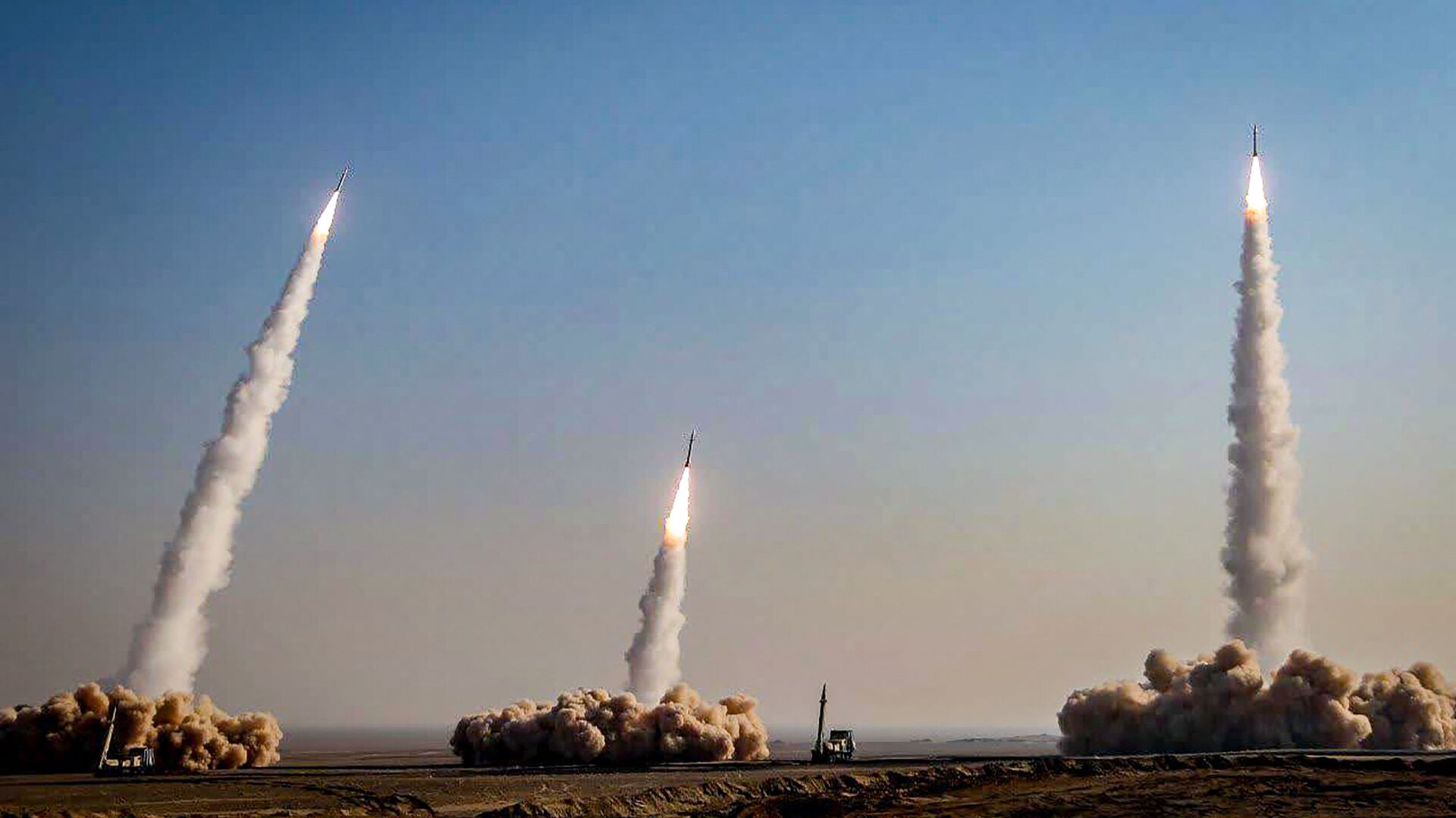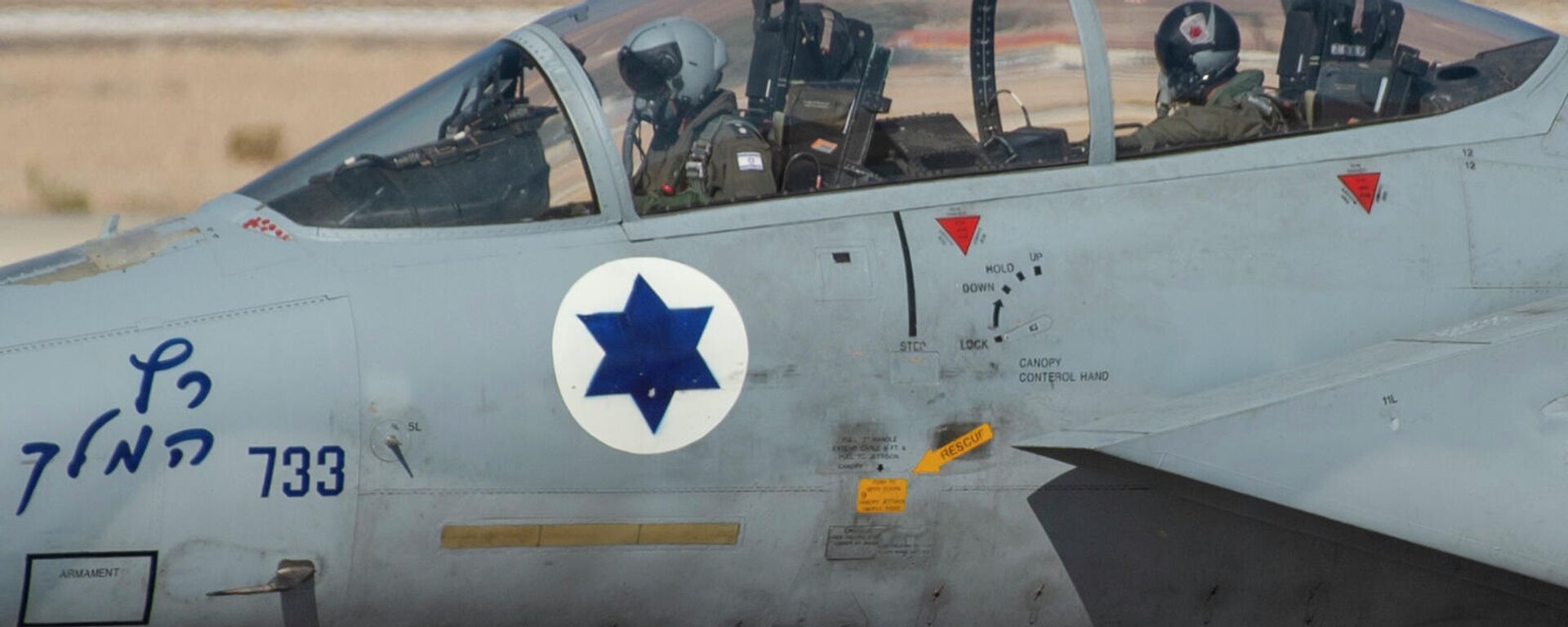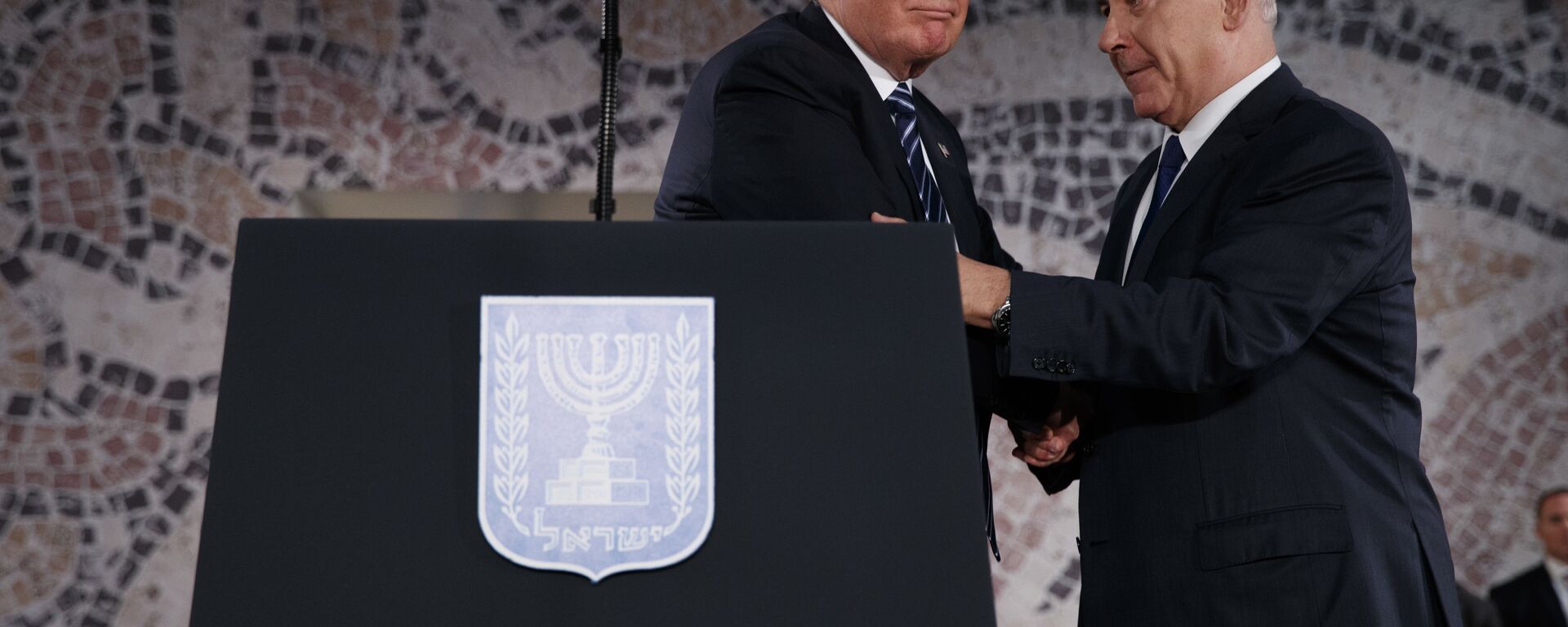Watch Simultaneous Launch of Over a Dozen Ballistic Missiles by Iran in Drills Aimed at Israel
17:23 GMT 24.12.2021 (Updated: 17:25 GMT 15.01.2023)

© AFP 2023 / SEPAH NEWS
Subscribe
Over the past three decades, Iran has developed and fielded a broad array of short, medium and long-range ballistic and cruise missiles. Tehran sees these capabilities as its main guarantee of strategic security against foreign threats, and has eschewed all efforts by other countries to put limits on its conventional missile arsenal.
The Revolutionary Guards’ Aerospace Force simultaneously launched 16 ballistic missiles of various classes on Friday during the final day of the Great Prophet 17 exercises, with footage of the launch captured by local media.
During the Great Prophet 17 military drills, #IRGC simultaneously fired 16 ballistic missiles at a single target and destroyed it. pic.twitter.com/qFYm8biamQ
— Hassan Mafi (@thatdayin1992) December 24, 2021
Among the missiles launched were the Emad, Ghadr and Sejjil medium-range ballistic missiles, which have a range of between 1,700 and 2,500km, the Zelzal – a massive unguided artillery rocket, which has an estimated range of 200km - and the Zolfaghar, a missile with a 700km range and an estimated accuracy of within a metre of its target. Iranian media says all 16 missiles hit their intended targets with 100 percent accuracy.
#Iran 's Top Commander: Great Prophet 17 Military Wargames Meant to Warn Israelhttps://t.co/zBVCIUTRfm pic.twitter.com/N3sQ84JbRh
— Fars News Agency (@EnglishFars) December 24, 2021
The final day of the drills also saw the simultaneous deployment of 10 drones, with footage showing Mohajer-6 UAVs taking on two naval targets using Ghaem-5 guided bombs.
Simultaneous strike aganst two naval targets by looks like Ghaem-5 guided bombs from Iranian Mohajer-6 UCAV during IRGC's "Great Prophet 17" drills. pic.twitter.com/WmdOvVWxw9
— Yuri Lyamin (@imp_navigator) December 24, 2021
The Great Prophet 17 drills kicked off across the southern Iranian provinces of Bushehr, Hormozgan and Khuzestan on 20 December, with portions of the waters in the Persian Gulf and the Strait of Hormuz also cordoned off for the exercises. The drills included mobile firing of anti-ship missiles by fleets of fast-moving missile boats, and the first time cruise missiles were fired from the Shahid Roudaki, a 150-metre multi-purpose oceangoing warship built out of a converted cargo vessel.
Launches of the anti-ship cruise missiles and rockets from missile and patrol boats of the IRGC Navy pic.twitter.com/T5di2aX9cW
— Yuri Lyamin (@imp_navigator) December 21, 2021
Launch of the Ghader or Ghadir ASM from IRGC Navy "Shahid Roudaki" forward floating base during "Great Prophet 17" drills. pic.twitter.com/cuRZ02EJm8
— Yuri Lyamin (@imp_navigator) December 24, 2021
The exercises also saw Revolutionary Guard cyber units suppressing mock enemy air defences using electronic warfare tools to poke holes in enemy missile defences.
Response to ‘Empty Threats’
Iranian Armed Forces chief of staff Mohammad Bagheri stated Friday that the Great Prophet 17 drills were carried out when they were for a specific reason: threats coming from Israel.
“This exercise was planned in advance, but the numerous empty threats of the Zionist regime’s officials in recent days caused this exercise to take place at this time,” Bagheri said. The commander warned that “if the officials of this regime do a damn thing [against Iran], we will cut off their hands”.
Bagheri did not elaborate on what “threats” from Israel he was referring to. However, earlier this week, incoming Israeli Air Force commander, Tomer Bar, warned that Tel Aviv could attack the Islamic Republic’s nuclear facilities as soon as “tomorrow” if ordered to do so. The 52-year-old says that he expects an Israeli attack on Iran to happen within his lifetime.
Earlier this year, Israel set aside $1.5 billion in its defence budget to prepare for possible strikes on Iran, either independently or in coordination with Washington. That amount accounts for less than half of the $3.8 billion in military aid sent to Israel by the United States in 2021.
On Monday, Gholam Ali Rashid, the chief of the Iranian Armed Forces Central Command HQ, suggested that Israel wouldn’t dare try to strike Iran without first receiving a “green light” from the US. The commander warned that any strike would spark a “crushing attack [by Iran] on all bases, centres, paths, and space used to carry out the aggression without delay.”
Israeli officials have spent decades accusing Iran of seeking to develop nuclear weapons, with pressure by Mossad and former Israeli prime minister Benjamin Netanyahu proving instrumental in lobbying the Trump administration into pulling out of the Joint Comprehensive Plan of Action nuclear deal in 2018. Israel subscribes to the so-called ‘Begin Doctrine’, named after former Israeli Prime Minister Menachem Begin, under which it gives itself the unilateral authority to target any country in the Middle East it suspects may be building nuclear weapons. Tel Aviv has already implemented the doctrine twice, first against Iraq in 1981, and then against Syria in 2007.
Iran denies that it is pursuing nuclear weaponry or weapons of mass destruction of any kind, saying its nuclear programme is restricted to peaceful purposes. The Islamic Republic has repeatedly criticised the international community over its alleged double standard in the way it treats Tehran nuclear programme compared with that of Israel, which is widely suspected already to possess dozens or even hundreds of nuclear weapons, and the capability to deliver them using ground-based missiles, aircraft and submarines. Tel Aviv has neither confirmed nor denied its status as a nuclear weapons power.


